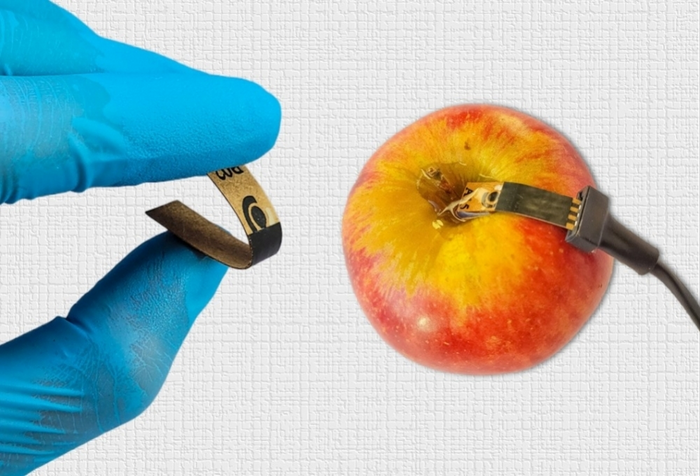Researchers at the University of São Paulo (USP) in Brazil have developed a kraft paper-based electrochemical sensor that can detect traces of pesticides in fruit and vegetables in real time when coupled to an electronic device. In an apple or cabbage, for example, it can detect carbendazim, a fungicide widely used in Brazil despite being banned.

Credit: José Luiz Bott Neto
Researchers at the University of São Paulo (USP) in Brazil have developed a kraft paper-based electrochemical sensor that can detect traces of pesticides in fruit and vegetables in real time when coupled to an electronic device. In an apple or cabbage, for example, it can detect carbendazim, a fungicide widely used in Brazil despite being banned.
The research behind the invention was supported by FAPESP via three projects (18/22214-6, 19/13514-9 and 22/03758-0) and involved groups at the São Carlos Physics Institute (IFSC-USP) and São Carlos Chemistry Institute (IQSC-USP). The results are reported in an article published in the journal Food Chemistry.
“To find out whether a food sample contains traces of pesticides by conventional methods, you must grind up the sample and submit it to time-consuming chemical processes before any such substances can be detected. Wearable sensors like the one we developed for continuous monitoring of pesticides in agriculture and the food industry eliminate the need for these complex processes. Inspection is much easier, cheaper and reliable for a supermarket, restaurant or importer, for example,” said Osvaldo Novais de Oliveira Junior, penultimate author of the article and a professor at IFSC-USP.
The new device is highly sensitive and resembles the glucometers used by diabetics to measure blood sugar, except that the results of food scanning for pesticides are displayed on a smartphone. “In the tests we performed, its sensitivity was similar to the conventional method’s. Plus, it’s fast and inexpensive,” said José Luiz Bott Neto, corresponding author of the article and a postdoctoral fellow at IFSC-USP.
How it works
The device consists basically of a paper substrate modified with carbon ink and submitted to electrochemical treatment in an acid medium to activate carboxyl groups and make detection possible, Bott Neto explained.
“We use the silkscreen process to transfer carbon-conducting ink to a strip of kraft paper, thereby creating a device based on electrochemistry. It has three carbon electrodes and is immersed in an acidic solution to activate the carboxyl groups. In other words, oxygen atoms are added to the structure of the carbon electrode. When it comes into contact with a sample contaminated with carbendazim, the sensor induces an electrochemical oxidation reaction that permits detection of the fungicide. The quantity of carbendazim is measured via electrical current,” he said.
In developing the device, the researchers evaluated the stability and structure of the paper substrate. “The properties of the paper itself were an important part of our research,” said Thiago Serafim Martins, first author of the article and a postdoctoral fellow at IFSC-USP.
Best option
The researchers analyzed kraft paper and parchment, finding both types of paper to be stable enough to serve as a substrate for the sensor. However, the porousness of kraft paper conferred more sensitivity on the sensor and the carboxyl groups formed during electrochemical activation, Martins explained, adding that paper-based electrodes could be used in many applications. “There are commercial electrodes made of plastic or ceramic material. We successfully developed electrochemical sensors based on paper, a much more malleable material and therefore potentially useful in many areas, not just on farms or in supermarkets, but also in healthcare, for example,” he said.
About São Paulo Research Foundation (FAPESP)
The São Paulo Research Foundation (FAPESP) is a public institution with the mission of supporting scientific research in all fields of knowledge by awarding scholarships, fellowships and grants to investigators linked with higher education and research institutions in the State of São Paulo, Brazil. FAPESP is aware that the very best research can only be done by working with the best researchers internationally. Therefore, it has established partnerships with funding agencies, higher education, private companies, and research organizations in other countries known for the quality of their research and has been encouraging scientists funded by its grants to further develop their international collaboration. You can learn more about FAPESP at www.fapesp.br/en and visit FAPESP news agency at www.agencia.fapesp.br/en to keep updated with the latest scientific breakthroughs FAPESP helps achieve through its many programs, awards and research centers. You may also subscribe to FAPESP news agency at http://agencia.fapesp.br/subscribe.
Journal
Food Chemistry
DOI
10.1016/j.foodchem.2023.135429
Article Title
Optimized paper-based electrochemical sensors treated in acidic media to detect carbendazim on the skin of apple and cabbage
Article Publication Date
6-Jan-2023




